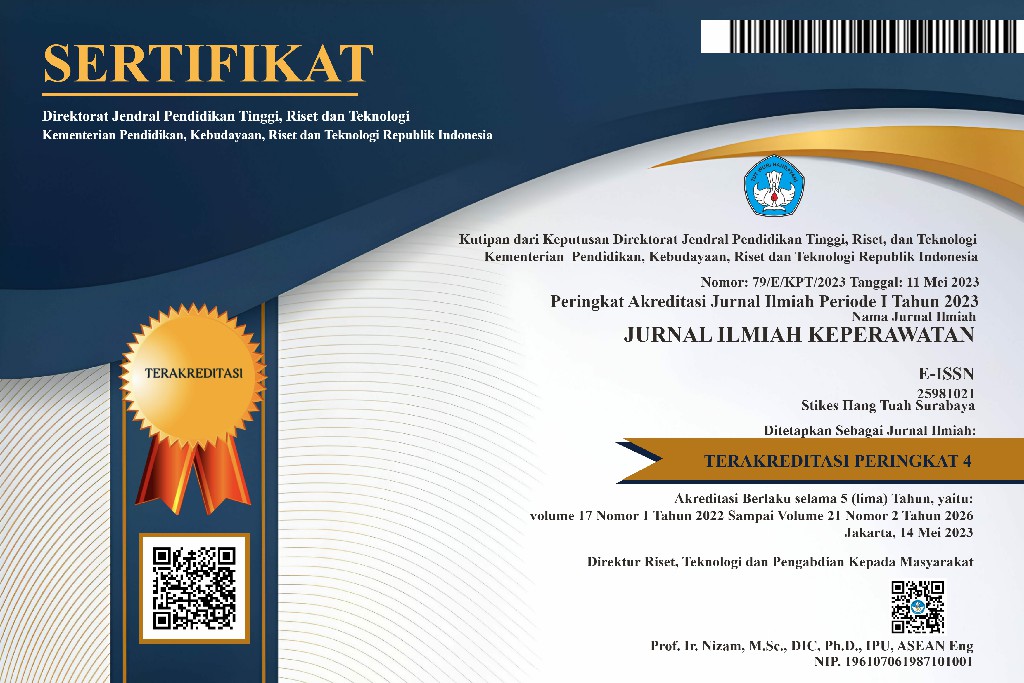The Overview of Child development During the Covid-19 Pandemic
DOI:
https://doi.org/10.30643/jiksht.v18i1.249Keywords:
Tumbuh, Kembang Anak, Covid-19Abstract
During the Covid-19 pandemic, various activities to stimulate young children suddenly stopped due to the emergency condition of the Covid-19 outbreak, However, the stimulation of growth and development for young children was quite ongoing and obtained quite good results by implementing the Covid-19 health protocol. The aims of this study is to describe the growth and development of children during the Covid-19 pandemic. The research method used is qualitative research with a phenomenological approach. The data collected is by means of participants observation and in-depth interviews through FGDs. The research results obtained are that children's growth and development can be seen by monitoring in the form of anthropometric measurements at the puskesmas or public health centers, as well as passive monitoring of growth and development as seen from the KIA’s handbook to prevent mass crowds as an effort to prevent the transmission of Covid-19 . The result in this study found that most were on the growth line in the KIA’s Handbook, while for the level of nutritional intake there were still some children who were lacking in nutrition. Most of the development of gross and fine motor skills in children is in accordance with the KIA’s handbook, however there are a few whose development is not in line with the KIA’s handbook, this could be due to one of the contributing factors, namely nutritional intake. In addition there are 44.44% of children experienced the negative impact of the pandemic on their children's mental-emotional condition, 33.33% of their mental-emotional condition was not affected due to the covid 19 pandemic and 22.22% did not provide clear information. Some of contributing factors that hinder children's growth and development, one of which are nutritional status , the cooperation with health care facilities , and also the support from parents to use educative indoor games and family recreation by implementing the Covid-19 health protocol.Downloads
References
Anggreni, D., Lubis, L. A., & Kusmanto, H. (2022). Implementasi program pencegahan stunting di puskesmas Dolok Sigompulon Kabupaten Padang Lawas Utara. Histeria Jurnal: Ilmiah Soshum Dan Humaniora, 1(2), 91–99.
Askar, N. N. (2021). Faktor yang mempengaruhi pemanfaatan posyandu balita di Kelurahan Sudiang wilayah kerja Puskesmas Sudiang Kota Makassar selama pandemi Covid-19 [Universitas Hasanuddin]. http://repository.unhas.ac.id/id/eprint/6011/
Badan Pusat Statistik. (2021). Pertumbuhan Ekonomi Indonesia Triwulan IV-2020. Badan Pusat Statistik. https://www.bps.go.id/pressrelease/2022/02/07/1911/ekonomi-indonesia-triwulan-iv-2021-tumbuh-5-02-persen--y-on-y-.html
Elihami, & Hasnidar. (2019). Manajemen Pendidikan Anak Usia Dini Melalui Pendidikan Karakter. CV. Rasi Terbit.
Kemenkes RI. (2016). PEDOMAN PELAKSANAAN Stimulasi, Deteksi dan lntervensi Dini Tumbuh Kembang Anak di Tingkat Pelayanan Dasar. https://banpaudpnf.kemdikbud.go.id/upload/download-center/Buku SDIDTK_1554107456.pdf
Kementerian Kesehatan RI. (2020). Panduan Kesehatan Balita Pada Masa Tanggap Darurat Covid-19. Kementerian Kesehatan Republik Indonesia, 1–60. https://infeksiemerging.kemkes.go.id/download/Panduan_Yankes_Balita_Pada_Masa_GapDar_Covid19_Bagi_Nakes.pdf
Kostania, G., Damayanti, M., Prabasari, S., Ningsih, D., Ivantarina, D., Yuniarti, F., Ertiana, D., Mulyati, E., Mardiana, H., Rahmawati, N., Viandika, N., Suhartini, L., Luqmanasari, E., Anggraini, R., Khuzaiyah, S., Argaheni, N. B., Kamila, N., Wulandari, U., Wijayati, W., & Adnani, Q. E. S. (2021). Adaptasi Kebiasaan Baru dalam Kebidanan di Era Pandemi Covid-19 Edisi-2.
Kusparlina, E. P. (2021). Pengaruh Pelatihan Terhadap Pengetahuan tentang Gizi Buruk dan Inter-Professional Collaboration Petugas Puskesmas. 2-Trik: Tunas-Tunas Riset Kesehatan, 11(2), 131. https://doi.org/10.33846/2trik11214
Pratiwi, F. (2021). Gambaran Perkembangan Anak Usia Dini Dalam Pembelajaran Daring Selama Pandemi Covid-19. Jurnal Pendidikan Anak, 7(1), 09–18. https://doi.org/10.23960/jpa.v7n1.22282
Rustini, S. A., & Rustam, M. Z. A. (2020). Pengaruh Pengetahuan, Sikap Ibu dalam Pemberian Taburia pada Balita Stunting Terhadap Berat Badan di Posyandu RW VIII Puskesmas Bulak Banteng Surabaya. Jurnal Ilmiah Keperawatan Stikes Hang Tuah Surbaya, 15(2), 233–242. https://doi.org/10.30643/jiksht.v15i2.113
Saputra, I. M. (2017). Peranan orangtua asuh dalam membinaan akhlak remaja di Panti Asuhan Budi Mulya Sukarame [Universitas Islam Negeri Raden Intan Lampung]. http://repository.radenintan.ac.id/5755/1/IMAS.pdf
Setiati, S., & Azwar, M. K. (2020). COVID-19 and Indonesia. April.
Sugeng, H. M., Tarigan, R., & Sari, N. M. (2019). Gambaran Tumbuh Kembang Anak pada Periode Emas Usia 0-24 Bulan di Posyandu Wilayah Kecamatan Jatinangor. Jurnal Sistem Kesehatan, 4(3), 96–101. https://doi.org/https://doi.org/10.24198/jsk.v4i3.21240
Winarti, A. (2020). Implementasi Parenting Pada Pendidikan Usia Dini di Masa Pandemi Covid-19. JurnalPendidikan PembelajaranPemberdayaan Masyarakat, II(2), 131–145. http://ejournal.uicm-unbar.ac.id/index.php/jp3m/article/view/272/142
Yanti, N. L. G. W. (2018). Peran Bidan Pada Pelaksanaan Permenkes Nomor 66 Tahun 2014 Melalui Kegiatan Stimulasi, Deteksi Dan Intervensi Dini Gangguan Tumbuh Kembang Anak Di Puskesmas Kota Yogyakarta. In Universitas Katolik Soegijapranata (Vol. 2, Issue 1). Universitas Katolik Soegijapranata.
Downloads
Published
Issue
Section
License
Authors retain copyright and grant the journal right of first publication with the work simultaneously licensed under a Creative Commons Attribution-ShareAlike 4.0 License that allows others to share the work with an acknowledgment of the work's authorship and initial publication in this journal.












